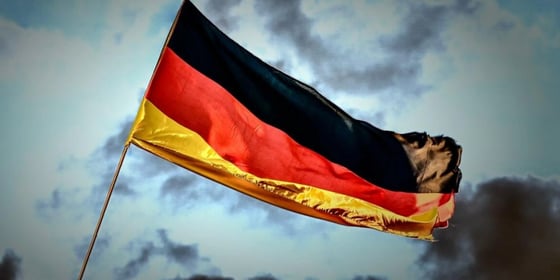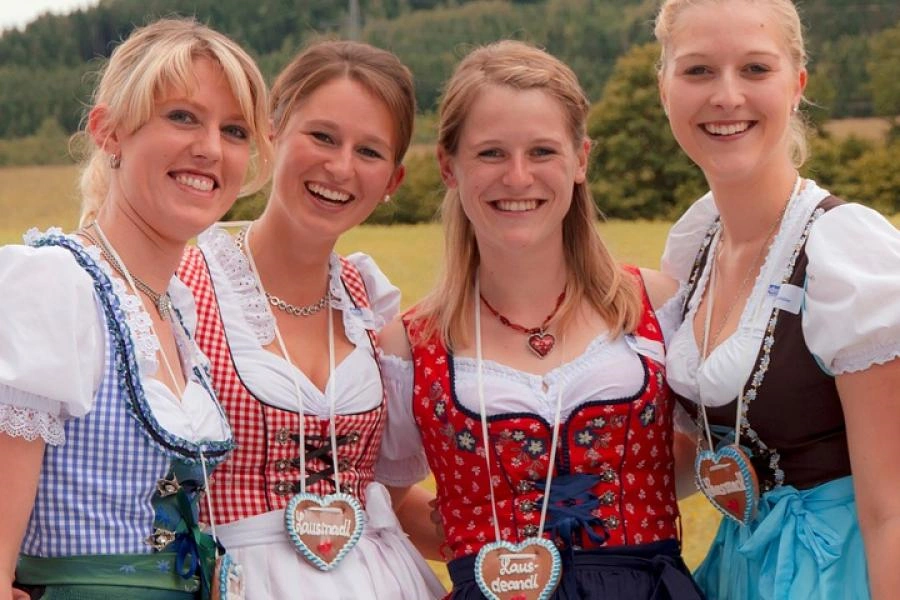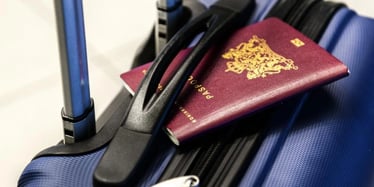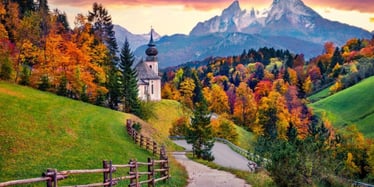German Culture

Contents
Germany is home to over 80 million people – as well as a diverse array of religions, customs, and traditions that make up the rich national psyche. Germany is known for its long and rich history, one that has put it at the forefront of European thought, politics, and art for over 1,000 years. This history has shaped a culture that combines predominantly Christian values with literature, art, philosophy, logic, reason, and, of course, a love of beer and sausages.
Consider this article a handy overview of German culture that will touch on the most notable points and facts regarding German values, lifestyle, customs and traditions, and will help you understand Germans better.
German People, Traditions and Facts
The German people face their fair share of stereotypes...
...such as how they like to save their space on a deck chair with a towel whilst on holiday or ensure that public transport (and, well, everything) runs on time. These things should be seen as a testament to their dedication to good planning and time-keeping. Secondly, there is, of course, a bit more to this nation’s populous than this.
What are the characteristics of German people?
It is true that many Germans tend to place punctuality as a high priority. Hence the global observation that German trains often run perfectly on time. German people tend to be thrifty, be sensible, and respect one another’s privacy, and they typically respect the structure and laws of society to an above-average degree. There is no place that this sense of ‘order’ is more apparent than in German business culture.
Traditionally, German people tie a lot of importance to notions of family and community. Regarding the latter, this is partially where the well-known ‘rule-following’ and orderly nature of the German people comes from: if everyone in the community follows the rules and does things the right way, the neighborhood/town/city/country will be a nice place for all residents to live, hence why many might seem like sticklers when it comes to correct recycling and late-night noise - they take it seriously for the sake of everyone.
Directness of German People
If you’re coming to Germany from the US, the UK, or Latin America, you may initially be surprised by the ‘directness’ of German people. But do know that in pretty much all cases, this is not meant to offend or be rude. You will soon become more comfortable with this cultural trait that encourages honesty, openness, and sincerity when communicating with one another and that avoids polite superficiality.
What is the culture of Germany?
Considered a country of thinkers, poets, and, nowadays, businesspeople, German culture and people are, to a large extent, all about reason and logic. Germany shares a lot of culture and tradition with neighboring countries, especially the Germanic-speaking Austria and Switzerland.
An important thing to know about German culture is that residents are expected to respect order and structure. It’s important to be on time, not just for work but for social events too, and to follow rules that are in place for the greater good of everybody who lives there.
German culture has been shaped over thousands of years. It was originally a pagan country, and then an important seat of the Holy Roman Empire. It was also the birthplace of the Protestant reformation. Today, Christians, Catholics, and Muslims coexist happily in Germany - you can read more about the religious diversity of the country on our Religions in Germany page.
What is German Culture known for?
Some of the key characteristics of German culture that the nation is famously known for include the aforementioned timeliness and order that is apparent in most parts of German society. From an onlooker’s viewpoint, good beer (and Oktoberfest), delicious sausage, hiking, traditional ‘Oom-Pah’ folk music, and holiday-making make-up a key part of the country’s identity.
At closer inspection, there is a larger array of food, drink, history, and leisure activities that are also important aspects of their culture. And on a more serious note, in the modern era, Germany has grown to become a large and stable economy that contributes to global development and peace.
A quick list for getting a grip on the basics:
-
Official Language: German (most would consider High German, or Hochdeutsch, to be the most ‘official’ version of the language)
-
Population: 82 million
- National Anthem: Nationalhymne
German culture symbols
As a historically Christian country, many cultural symbols have emerged from religion. This includes obvious symbols such as the crucifix and indirect symbols such as the shape of a pretzel (said to represent the Holy Trinity). With a large Muslim population, the Moon and Star of Islam is now also considered an important culture symbol in Germany.
Other symbols of German culture are famous names from the arts, politics, and philosophy such as Goethe, Beethoven, Klee, Kant and Marx (and David Hasselhoff probably belongs on this list, too – quite seriously). Modern culture symbols include both the German flag and the flag of the European Union.
Generally, Germans tend to balance traditional Christian values with progressive, liberal, and inclusive attitudes
Germany can be considered a modern and advanced society in lots of ways. The nation has some of the most progressive policies regarding gender equality, LGBT rights, and immigration. In recent years policies to allow more immigrants to enter the country have come about as more German people have begun to value the benefits of a diverse multicultural society.
75% of Germany’s population are urban dwellers, and it is in these urban areas where you will find the most liberal attitudes towards homosexuality, gender equality, and refugees.
German people traditionally have strong family values, and even today, it is not uncommon to find several generations of a family all living in or around the same town or city - even in the larger or more transient cities like Berlin - who meet up often and celebrate or go on vacation together. Generally, they are also quite neighborly, and most will invest in their neighbors by getting to know them and creating a sense of community - again, not just in the smaller towns.
For decades, Germany has shown its commitment to renewable energy and protecting the environment. It has long been at the forefront of pioneering new technology to help in the war against fossil fuels, CO2 emissions, and pollution, and its dedicated garbage recycling system is one of the most thorough in the world. This should certainly be lauded as one of the country’s most impressive values.
When it comes to school and work, it seems to be ingrained in most German people that they should be conscientious and hard-working, which is probably why the country can boast impressive economic development and one of the best education systems in the world.
Garbage bins
The first thing to check out when you arrive in your new German apartment: the garbage bins. Learn how to separate your garbage at home and which colour communal bin it should go into outside. A very important thing to get right to ensure that everything can be recycled properly!
German Lifestyle
Most German’s neither live to work nor work to live
But a lot of Germans find that the two can be enjoyed harmoniously (the rest of the world should probably take note). The average working week in Germany is around 35-40 hours, one of the lowest in Europe. Productivity, however, is high, and whilst at work, most Germans take pride in doing a good job. And when not at work, they partake in a range of leisure activities and pastimes.
Board games
Germany is one of the world’s biggest producers of board games and has been responsible for the invention of many of the biggest names in the realm of so-called Eurogames (strategy-based board games). German-invented board games also include Carcassonne, The Settlers of Catan, and Ticket to Ride although you will also find German versions of most top games in local game shops, such as Trivial Pursuit, Monopoly, and Cluedo.
Most German households will have a number of board games at their disposal, and playing them is considered an excellent way to spend time with friends of all ages.

Travel
Many Germans are passionate about international travel, and taking foreign holidays is an important part of the lifestyle. In fact, Germany spends more per capita on international travel than any other country in Europe.
The biggest holiday destinations for Germans are Italy, Spain, and Austria, but thanks to the country sharing nine land borders with other countries, it’s really easy to take a European trip from Germany.

Sport
Sport is an integral element of German society, both in terms of participation and spectating. A third of all German residents belong to a sports club or organization and hundreds of thousands watch football, ice hockey, and handball games every week.
Find out more about the most-played and -watched sport in Germany on our German Sport page.

Gardening
With three quarters of all Germans living in cities, urban gardening has become very popular and even those who live in high-rise apartments will find a way to add greenery to their apartment.
Many Germans have their own plot in a communal garden (similar to an English allotment), known in Germany as a Schrebergarten, that city dwellers travel to during the holidays or weekends.

Food and Drink
German food culture revolves around the preparation of hearty meals. Meat in Germany is very popular and is typically eaten with most meals, along with bread and potatoes. German cooking includes national dishes such as Rouladen, German noodles (Spätzle) and Schnitzel.
On a day-to-day basis, a cooked breakfast, a cooked lunch, and a dinner of bread, ham, cheese, and pickle could be considered typical. Dining out is popular, and cities and towns are all home to a range of fast food stops, bakeries (namely German or Turkish), deli outlets, and German and international gourmet restaurants as well as (increasingly in the bigger cities) food markets, pop-ups, and street food.
Alcohol consumption is fairly high and is enjoyed in both bars and at home. By far the most popular drink is beer, followed by wine, schnapps, and brandy. Get a better idea of German food and drink culture on our German Food page.

Cars
As the country that invented the modern motor car and the birthplace of Audi, Volkswagen, Porsche, Mercedes-Benz, and BMW, it’s little wonder that Germans take great pride in their motor vehicles.
Many Germans view driving as a relaxing pastime as much as a means of getting from A to B. And you can often get from A to B quickly, thanks to the lack of a national speed limit on the Autobahn (motorway) and an excellent road network.

Car fans
Car fans in Germany can enjoy the BMW Welt & Museum in Munich, the Porsche or Mercedes-Benz Museum in Stuttgart, the Volkswagen’s Gläserne Manufaktur (Transparent Factory) in Dresden and much more all over the country.
German customs and traditions
There is a wide number of historic and traditional German customs. There are also a number of customs that have emerged in the modern postwar era
What are some of Germany’s traditions?
As a Christian country there are many protestant and catholic traditions which are observed and celebrated throughout the year. To make sure you are familiar with Germany’s calendar of national and regional holidays and celebrations, make sure to take a look at our German Holidays and Celebrations page.
Contemporary German traditions include ‘Kaffee und Kuchen’, the equivalent of an English Afternoon tea whereby families and friends stop working to come together in the afternoon for coffee and cake. The annual Munich Beer Festival, known the world over as Oktoberfest, is also a key tradition.
Tradition and Holidays
If you’re planning to move to Germany, it’s worth becoming familiar with the traditions and holidays for many practical reasons: so you know when shops will be closed, when you can expect days off work/school, and what your children will have to bring to school on certain days. Make sure you are familiar with the holiday plan and customs to avoid last-second stress!
Traditional clothes
Traditional clothing in Germany includes the world-famous Lederhosen, an outfit once worn by rural men, traditionally those undertaking farm work or manual labor. A knee-length set of breeches complete with braces, worn over a short sleeve shirt, Lederhosen are traditionally associated with Bavarian and Tyrolean culture.
For women, traditional German clothes include the Dirndl, a dress made from a bodice, pinafore and full skirt. The shirt underneath is usually low cut and made with short puffy sleeves. Today these clothes are no longer seen on farm workers but on the staff and partygoers at beer festivals.

This might also be of interest to you

How to Move to Germany as an American in 2025
Germany is one of the most popular destinations for Americans looking to relocate to Europe. Whether you’re moving for work, education, or simply for...

German Months
Fundamental to learning any language is becoming familiar with how to talk about days, weeks, months, and years. Mastering how to communicate about...

German Culture
Germany is home to over 80 million people – as well as a diverse array of religions, customs, and traditions that make up the rich national psyche....

Costs of Living in Germany
Anyone planning on moving to or studying in Germany needs to know exactly how much it is going to cost to live there. Part of planning this exciting...

15 Best Places To Visit In Germany [Guide]
Germany is a fascinating country with an abundance of attractions that draw tourists from all over the world. From the vibrant city life of Berlin to...

Visa for Germany - A Complete Guide for All Visa Types
A visa is necessary for many individuals moving to Germany to live, work, or study. There are several different types of visa in Germany, and it’s...

Tourism in Germany
Germany Tourism: Why Germany is one of the top tourist attractions in the world Visiting Germany's most famous cities is a top priority for many. But...

Insurances in Germany
“Germans have insurance for everything” - that might sound superficial but it is true. German insurance system offers a wide choice of ways to ensure...




